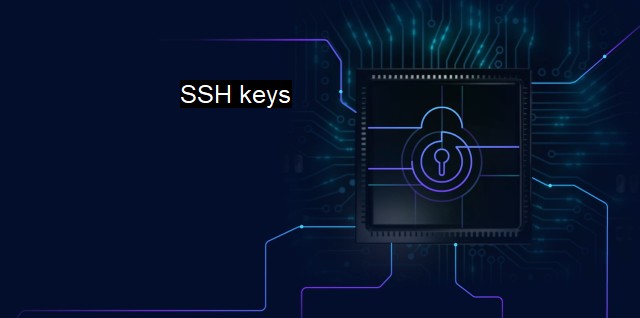What are SSH keys?
Safeguarding Communication: Essential Role of SSH Keys in Cybersecurity, Antivirus, and Remote Access Management
Secure Shell (SSH) keys are a pair of cryptographic keys that are used to authenticate a client to an SSH server without the use of passwords. This technology was developed to increase the strength and complexity of authentication, thus significantly enhancing cybersecurity.Any means to safeguard against unauthorized access is vital. SSH keys form an integral part of this defensive arsenal, handling data transmissions securely in a network environment. They can be likened to an ultra-secure and complex cryptographic "handshake" between two parties, ensuring safe and authenticated communication.
To grasp the concept of SSH keys, it is essential first to understand what SSH itself denotes. Secure Shell Protocol (SSH) is a protocol designed for managing networks, operating systems, and configurations. Notably, it is utilized to log into shared computing environments securely over an unsecured network. SSH keys deliver safer authentication and encrypted secure communication, thus considerably lowering the risks affiliated with untamed data hijack.
SSH keys are designed in pairs - each pair is made up of a private key and a public key. The SSH protocol uses this key set to create a secure connection between the client and the server. The private key is securely stored on the computer you want to log in from, while the public key is placed on the server or the system you want to log in to. It's critical that the private key remains highly confidential because if it's compromised, any system containing the public key pair could potentially be accessed.
In terms of operation, when the client initiates a connection, the server will encrypt a random message with the public key and send it to the client. If the client can decrypt it using the private key, it means that the client is in possession of the matching private key. This proves the client's identity to the server, and the server will permit access.
SSH key authentication can be robust and nearly impenetrable, making it highly preferred in security-intensive environments. An intruder finding the private key by brute force is statistically improbable, given the immense number of possible key combinations.
Concerning the relationship between SSH keys and antivirus systems, while SSH keys in themselves cannot function as antivirus solutions, they significantly safeguard systems against attacks that might necessitate antivirus intervention. Since SSH keys rule out unauthorized entries, they naturally reduce the chance of malicious attacks that could carry virus, ransomware, or spyware payloads. Notwithstanding, SSH keys should always form part of a comprehensive security framework that includes malware and antivirus protection.
Secure management of SSH keys is fundamental to cybersecurity. Mismanaged or unsecured SSH keys can pose a significant risk, possibly resulting in unauthorized access, data breaches, or compliance violations. Thus, many organizations invest in SSH key management systems to maintain, control, and routinely audit their keys.
To sum up, SSH keys provide an elevated level of security and convenience within network environments. They establish a validity that verifies the identities involved in network communications, preventing potential hackers from gaining unauthorized access. Though they do not replace necessary antivirus protection, SSH keys form an incredibly vital link in the chain of a comprehensive cybersecurity defense treatment.

SSH keys FAQs
What are SSH keys and how do they work in cybersecurity?
SSH keys are a pair of cryptographic keys that can be used for secure communication between two parties. They consist of a private key and a public key which are used for authentication and encryption. In cybersecurity, SSH keys are widely used for remote access to servers, data backup, and data transfer.Why are SSH keys more secure than passwords in cybersecurity?
SSH keys are more secure than passwords because they are much harder to crack. Passwords can be guessed, stolen, or intercepted. On the other hand, SSH keys are nearly impossible to guess or steal. This is because the keys are randomly generated and come in pairs. The private key is kept on the user's computer and the public key is stored on the server. The server only allows access to users with the corresponding private key.What are the benefits of using SSH keys in antivirus software?
Using SSH keys in antivirus software can help improve security by limiting the access of unauthorized users to the system. Antivirus software can use SSH keys to authenticate the user and limit access to authorized users only. This reduces the risk of malware attacks and data breaches.How can I generate SSH keys for use in cybersecurity?
To generate SSH keys, you need to use a key generator tool that is available on most operating systems. In Windows, you can use the PuTTYgen tool. In Linux and macOS, you can use the ssh-keygen command in the terminal. Once you generate the keys, you need to copy the public key to the remote server and configure the server to accept it. Then, you can use the private key to authenticate and access the server securely.| | A | | | B | | | C | | | D | | | E | | | F | | | G | | | H | | | I | | | J | | | K | | | L | | | M | |
| | N | | | O | | | P | | | Q | | | R | | | S | | | T | | | U | | | V | | | W | | | X | | | Y | | | Z | |
| | 1 | | | 2 | | | 3 | | | 4 | | | 7 | | | 8 | | |||||||